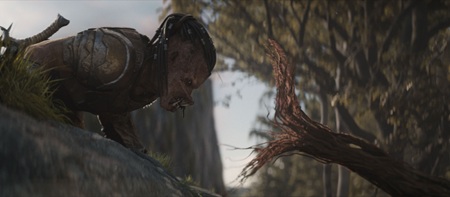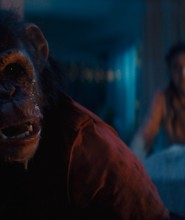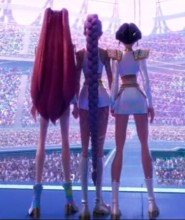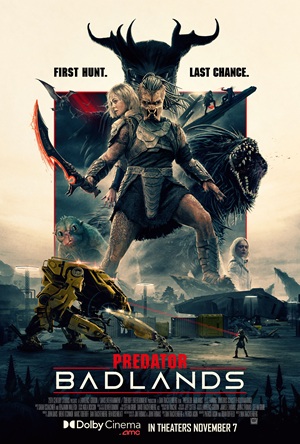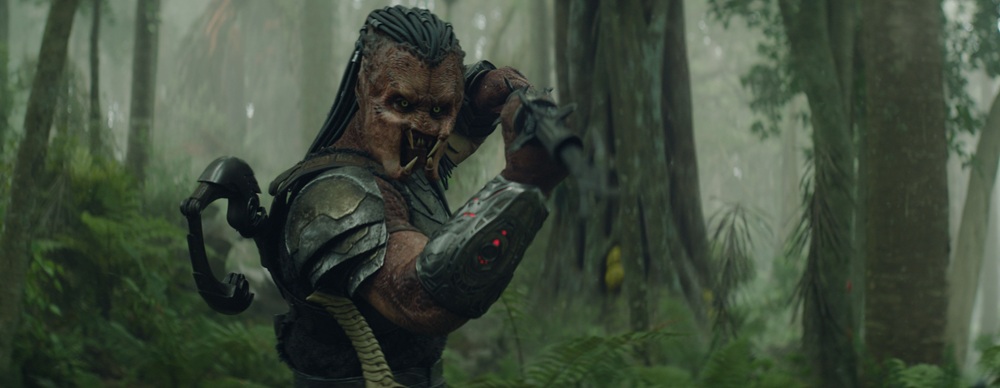
Intelligent, Violent, and Emotionally Lush Badlands Hunts Greatness
There is a moment during the opening prologue of Predator: Badlands where filmmaker Dan Trachtenberg makes it clear he’s going to shake up the franchise’s formula. Set in the undisclosed distant future, the film’s young Predator hero — also known as a “Yautja” — Dek (Dimitrius Schuster-Koloamatangi) watches from behind a protective shield as his father (also Schuster-Koloamatangi, but voiced by Reuben de Jong) and brother, Kwei (performed by Michael Homick, voiced by Stefan Grube), trade blows. He is helpless to assist.
The look of pain on Dek’s face, of outright terror, quickly morphs between sadness, fury, resolve, and back to pain once more. It is a stunning scene, and one that this franchise, with all its highs (1987’s brawny Predator), lows (2007’s Alien vs. Predator: Requiem, 2018’s The Predator), and curious in-betweens (1990’s Predator 2, 2010’s Predators), has never seen before: an emotional Yautja. More than that, one who is also afraid and uncertain. Dek is a castaway, an inexperienced hunter driven on by anger, his entire reason for pushing forward built on a foundation of deep, mercilessly cruel heartache he has no idea how to deal with.
It’s a terrific hook. Trachtenberg and screenwriter Patrick Aison, who also collaborated on 2022’s Prey, embrace the inherent macho absurdity of the Yautja lore and turn it on its head. What would a society based entirely on such a solitary, kill-or-be-killed ethos look like? How would clans function? This melding of blinding technical innovation fused with a brutally primitive social hierarchy; what would that combination look like under a microscope?
Pretty nasty, I’d guess, and it seems that Trachtenberg and Aison agree. Dek is the runt of his clan’s litter and, as such, according to Yautja tradition, should be exterminated. But Kwei sees something in his brother that their father does not, and, because of this, willingly sacrifices himself so Dek may survive. Granted, this survival means marooning him on the planet Genna, otherwise known as the “death planet,” so he can prove his mettle. Dek is sent there to slay a supposedly unkillable beast called the Kalisk and bring its head back to their home world as a trophy that no Yautja, even their father, would dare question as being anything less than magnificent.
As dead-serious as that may sound, Trachtenberg does not skimp on the fun. Or the silly. Enter Thia (Elle Fanning), a Weyland-Yutani synthetic placed on Genna to document the planet’s lethal flora and fauna. After her team of fellow synthetics was attacked by the Kalisk, she was one of the few to make it out of the encounter operational. The problem is, she seems to have lost the lower half of her body. Thia offers to help Dek in his quest if he’ll reunite her with those pesky missing legs, the Yautja initially hesitant to agree until he decides to consider the synthetic a “tool” and not a fellow sentient traveler.
The pair’s evolving relationship is key to this eye-popping science fiction actioner’s success. She’s bubbly, informative, and extremely talkative. He is the opposite on all counts. But, together, their mixture of brawn, cunning, dexterity, and intelligence manages to put Genna and its wide array of lethal adversaries on the defensive. They use this world to their advantage, even making friends with an iron-skinned pipsqueak of a creature they nickname “Bud,” Dek discovering that a true clan might not always be the one you’re born into, but instead the one you choose to lead, protect, and, yes, even love all on your own.
Fanning delivers one of the best performances of her career in a nifty dual role (she also plays Thia’s synthetic doppelganger/sister Tessa). In lesser hands, her primary character could have been a massive cartoonish annoyance. Instead, Thia’s constant patter becomes almost hypnotic. The synthetic isn’t just passing on information or telling stories of other cultures, races, or species; she’s giving Dek alternate points of view. Fanning handles all of this with aplomb, and most of the time with only the use of her upper body and a bevvy of suitably robotic facial inflections. She also brings an unexpected warmth to the proceedings that caught me by surprise. This helps make the climactic turn of events for Dek, Thia, and Bud universally insightful, cathartic, and worthy of a massive cheer.
Don’t misunderstand. This isn’t all gumdrops and rainbows. Even with a PG-13 rating, Trachtenberg still unleashes one of the most unrepentantly violent action spectaculars in recent memory (avoiding an R rating mainly because none of the blood of the injured or slain happens to be red). Dek’s landing on Genna is a visceral gut-punch that leaps from one near escape to another. Creatures are gobbled up, dissected, and otherwise disemboweled with pugnacious glee. Synthetics are dispatched in a bevy of creative ways.
It all boils down to the most unlikely of showdowns, one that pleasingly showcases all that Dek has learned during his hunt. The Yautja has changed his opinion on what it means to be a predator, but has done so not only via what he’s discovered during his time on Genna. He’s taken the lessons passed down within his clan from generation to generation and coupled that knowledge with both his brother’s selflessness and Thia’s babbling to create a new way forward that is uniquely and proudly his own.
The same can also be said about Predator: Badlands. Trachtenberg tips his hat to all of the past stories but refuses to be beholden to any of them, even the ones he directed himself (Prey, Predator: Killer of Killers). He understands that, to move forward, storytelling — much like life itself — must continually evolve, otherwise it is doomed to repeat itself, stagnate, and maybe even die. Such is the case here, and Trachtenberg resolutely refuses to let that happen. Let the hunt begin.
Film Rating: 3½ (out of 4)

